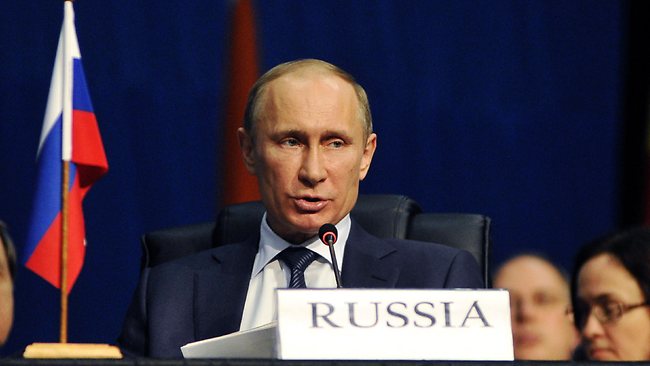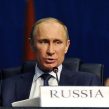
Putin Adopts Stalin’s Style, but Remains a Late Oligarch’s Legacy
Publication: Eurasia Daily Monitor Volume: 10 Issue: 60
By:

Boris Berezovsky, an entrepreneur and politician who personified the loaded term “oligarch,” effortlessly dominated the political debates in Moscow last week after his mysterious death in a mansion outside London on March 23. His 12 years in exile had been lonely, but hundreds of friends who barely knew him have been eager to share their reflections on Berezovsky, portraying his character as fiercely competitive and utterly unprincipled. Whereas, the concerted effort of the Russian state TV channels made Berezovsky into a larger-than-life figure who allegedly spun every political intrigue of the late-1990s. Present-day Russian politics, dominated by hundreds of self-serving bureaucrats and corrupt parliamentarians where power and money are in constant fusion, have become a close approximation of Berezovsky’s world as described by Russian television (Gazeta.ru, March 24; Forbes.ru, March 25). But this fixation on the failed political mastermind reflects rather poorly on President Vladimir Putin who keeps trying to erase the fact that it was, in fact, Berezovsky who chose Putin as Boris Yeltsin’s successor.
Putin had planned to make his visit to South Africa the central event of the past week, counting on the world’s high interest in the proto-organization known as BRICS (from the names of member states Brazil, Russia, India, China and South Africa). The gathering, however, yet again disappointed those who expect the “emerging powers” to take on greater responsibility for overcoming the crisis of global governance aggravated by an economic slowdown (Gazeta.ru, March 28; Kommersant-FM, March 29). The five states position themselves too differently vis-à-vis the United States and its key allies in the most challenging conflicts, from Syria to North Korea, and cannot reconcile their diverging interests (Nezavisimaya Gazeta, March 28). What made it hard for Putin to pretend that he performs an international role similar to former Soviet leader Joseph Stalin’s shrewd bargaining at the meetings of the “big troika” during World War II, was the fiasco over Russia’s inability to contribute to sorting out the financial disaster in Cyprus (Vedomosti, March 28). The Kremlin expressed great displeasure with the European Union plan for rescuing the Cypriot banks specializing in processing Russian money of different shades of gray, but that opinion was flatly turned down (Polit.ru, 28 March). Chinese President Xi Jinping, visiting Moscow a week prior to the BRICS summit, did not fail to register that inability to make a difference.
Irked by his weak hand in economic diplomacy, Putin decided to play up the dependable part of Stalin’s legacy—Russia’s status as a military superpower—and issued (in the middle of the long flight from South Africa) an order to launch large-scale military exercises in the Black Sea area (Rossiiskaya Gazeta, March 29). The usual spectacle consisted of a marine battalion from Sevastopol hitting a beach near Anapa and an airborne company from Tula performing a jump for the commander-in-chief—but the North Atlantic Treaty Organization (NATO) and Russia’s neighbors (Turkey said nothing) were not exactly entertained (Kommersant, March 30). Such an old-fashioned flexing of rather feeble muscles could have been far more impressive in the Far East, where North Korea drives itself into a frenzy by an ugly war dance, but Putin prefers to play it safe, not wanting to risk even a frown from Xi.
In the same day that he posed as a Generalissimo, Putin sought to boost his role as the “father of the nation,” conveying a conference of the Popular Front, which had been a vehicle of his electoral campaign but now is mobilized to demonstrate broad Russian support for the stern but benevolent leader (Gazeta.ru, March 29). This Front will constitute itself as a “public movement” so that it can retain a separate identity from the United Russia party, which is severely compromised by a chain of scandals. Furthermore, United Russia is formally led by Prime Minister Dmitry Medvedev, who seeks in vain to dissuade the enraged apparatchiks from blaming the media for uncovering their transactions in Cypriot “off-shores” or their expensive condominiums in Miami (Moskovsky Komsomolets, March 30). Putin wants to distance himself from this mess and sets for his Front the task of “building” (which is certainly an odd choice of word) social justice, symbolized by the reinvention of the Hero of Labor title, with the same five-pointed star medal that Stalin proudly displayed on his khaki jacket (Kommersant, March 30).
Calling for the hard-working “patriots” to rally under his wise leadership, Putin seeks to strike fear into the wavering elites and to suppress the propensity toward dissent among the disloyal middle classes. Toward the latter, dozens of non-governmental organizations (NGO), including such respected institutions as Memorial and Transparency International, were subjected last week to massive searches by the tax police and state prosecution—certainly a far cry from Stalin’s brutal repressions, but quite disruptive to the organizations’ work and frightening for many volunteers (Grani.ru, March 29). Characteristically, a firm protest from the German foreign ministry, which is preparing for Putin’s visit in early April, was enough to stop the “routine checks” of the activities of the German foundations, Konrad Adenauer Stiftung and Friedrich Ebert Stiftung, but the concern expressed by the US State Department was rebuffed as “interference in domestic affairs” (Novaya Gazeta, March 28; ITAR-TASS, March 30).
After so many years of reigning over a sycophantic court, Putin has probably lost the ability to see how pathetic are his attempts to copy the style of the dictator who is so powerfully present in the Russian political psyche, despite his disgraceful death 60 years ago. Rather, Putin is inescapably the heir to a different legacy—that of harvesting financial dividends from political projects, manipulating and falsifying elections, turning TV channels into tools of dirty propaganda—all tactics traceable to Berezovsky, the current Russian president’s former benefactor and arch-enemy. Berezovsky was a man of dubious virtue and problematic ambitions, most of which have failed. But his natural ardor for intrigue, freedom from vindictiveness and unpretentious generosity were rather attractive. Putin, to the contrary, does not seem to enjoy his power, which tends to dissipate into the corrupt bureaucracy. Instead, he appears trapped in his position, from which he can only be toppled by a street protest attracting another hundred thousand unruly Muscovites—or else be gently removed by his courtiers fed up with living a lie.




